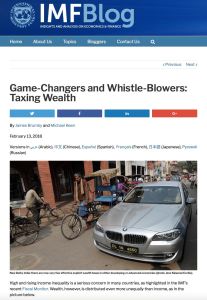Join getAbstract to access the summary!

Join getAbstract to access the summary!
James Brumby and Michael Keen
Game-Changers and Whistle-Blowers
Taxing Wealth
IMF, 2018
What's inside?
You’ve heard about income inequality, but what about the even bigger issue of wealth inequality?
Recommendation
Although income inequality has received a lot of attention lately, wealth inequality gets less notice. Economist Thomas Piketty, in his best-selling Capital in the Twenty-First Century, had even proposed a global wealth tax to tackle the problem, an idea that came to naught. The IMF’s James Brumby and Michael Keen provide an incisive look at ways in which governments could use their tax policies to target wealth inequality. getAbstract recommends this provocative report to policy experts, wealth managers, tax professionals and others with an interest in tax policy.
Summary
About the Authors
James Brumby is a director in the IMF’s governance global practice, and Michael Keen is a deputy director in the fiscal affairs department of the IMF.




















Comment on this summary